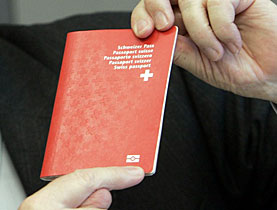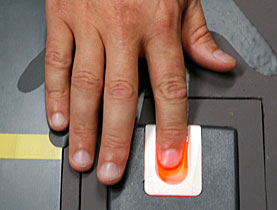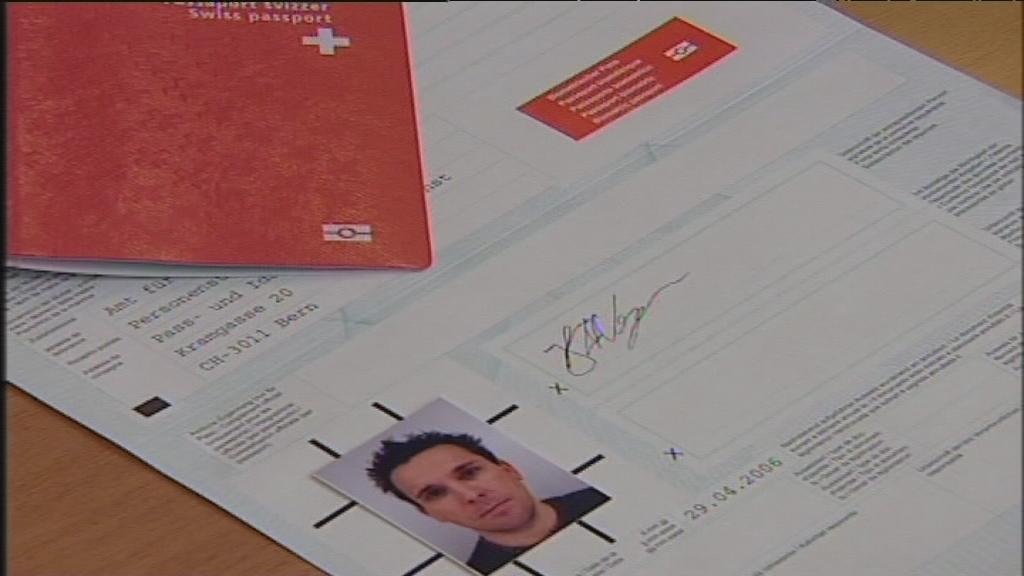Switzerland launches biometric passport

From March 1 biometric passports will be issued in Switzerland - containing a holder’s photograph and fingerprints - bringing the country into line with its neighbours.
The move was approved by a wafer-thin majority of voters last year amid scepticism over security. The Swiss abroad will be able to get their new passports from embassies and the document will allow visa-free entry into the United States.
“Switzerland is part of the Schengen area and is obliged to follow Schengen rules. It had until March 1 to issue biometric passports,” Markus Waldner, project leader for biometric passports at the Federal Police Office, told swissinfo.ch.
The country is one of the last to issue the e-passports or Passport 10, as they are known. France and Germany, for example, also members of the Schengen European single-border treaty, have employed the documents since 2006.
The project to implement the passports across the country has cost SFr29 million ($28 million) and has resulted in the equipping of around 40 special issuing centres across the country.
On a pre-launch media visit to canton Zurich’s main centre, not too far from the main station, the office still smelt of fresh paint. Booths, containing SFr37,500 worth of high-tech data machines, lined the walls.
Special offices are needed because, for the first time, getting a passport will necessitate an appointment in person.
“It’s only one visit. You don’t have to go to your local community authorities first, you can come directly to us if you have made contact first by telephone or email,” Peter Klossner, the head of the Zurich passport office, explained.
No smiling
First a photograph is taken, with the applicant being able to determine which one is used. But smiling is not allowed because a neutral facial expression is needed when the image is reproduced.
But people are allowed to look “friendly”, explained Federal Police Office official Philipp Bättig as he demonstrated the procedure.
“The next step is to register two fingerprints and for passports these come from both index fingers, this is an international standard,” Bättig added. Fingerprints are not taken from children under 12.
All the information recorded is then shown on a screen to the individual and he or she has to sign that it is correct on an electronic pad. The process takes around 15 minutes.
After that a fee is paid – it costs SFr140 ($133) for an adult and SFr60 for children under 18 years old or SFr148 and SFr68 if including an identity card as well. The passport is then sent to the applicant’s address.
US travel
Officials were keen to stress that it was not necessary to change passports straightaway. All previously issued documents are valid until they run out.
The new biometric passports will allow visa-free travel to the United States, which is not the case for all current passports.
The Swiss abroad will also be able to access the e-passports. “All our embassies will be equipped with the new equipment,” Waldner said.
Swiss voters approved the introduction of biometric passports last May by just 50.14 per cent, making this one of the closest results in recent Swiss history. A broad political coalition had challenged parliament’s decision to adopt the new passport and set up a fingerprint register.
Security fears
Fears had been raised over possible abuse of data registers and sensitive personal information by hackers and state agencies. Privacy concerns were also mooted.
Waldner said he was very sure that biometric passports were safe. “There has been some news in the media showing that chips have been read and photos exchanged,” he told swissinfo.ch.
“This was only possible because the passport readers were not implemented in the right way. Normally they should have detected this and ours will certainly detect these changes in the data.”
There have only been six changes of passports in Switzerland since 1915, with three in the past seven years.
“The development of new passports will go on in five to ten year cycles,” said Waldner. But for now, nobody is envisaging the use of iris-scanning, he said.
On March 1 biometric passports will be issued in Switzerland. The current 03 passports and biometric Passport 06 will be stopped. The Passport 06 was issued as part of a pilot project from September 4, 2006. This only held an electronic photo in the chip.
The new biometric passport allows travel to the US without a visa, as does the 06 version. The 03 version is only valid for a visa waiver programme if it was issued before October 26, 2006.
Also possibly on the cards are biometric C Permits for foreigners. The government will decide on an obligatory chip for ID cards.
There are around 100 million biometric passports in circulation around the world.
In all, 50 countries worldwide use the technology.
All the EU countries, except Britain and Ireland, are required to have biometric passports under Schengen rules. Britain and Ireland have biometric passports with the holder’s facial data on a chip.
In the United States, the Department of State has issued only e-passports as standard since August 2007, though non-biometric passports are valid until their expiry dates.

In compliance with the JTI standards
More: SWI swissinfo.ch certified by the Journalism Trust Initiative




You can find an overview of ongoing debates with our journalists here. Please join us!
If you want to start a conversation about a topic raised in this article or want to report factual errors, email us at english@swissinfo.ch.